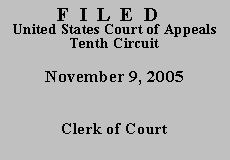 UNITED STATES COURT OF APPEALS
UNITED STATES COURT OF APPEALS
 UNITED STATES COURT OF APPEALS
UNITED STATES COURT OF APPEALS
TENTH CIRCUIT
(D. Kan.)
UNITED STATES OF AMERICA,
v.
No. 04-3337
MICHAEL SCOTT GLOVER,
(D.C. No. 00-CR-10121-01-MLB)
ORDER AND JUDGMENT(*)
Morrison, decided after the district court's order in this case, similarly involved a defendant's appeal from an order "authorizing involuntary administration of antipsychotic medication to render him competent to stand trial." Id. at 1181. As here, the district court approved forced medication based on its application of the four-part test set out in Sell v. United States, 539 U.S. 166 (2003). We vacated and remanded because the district court did not consider possible alternative bases for administering the drugs before conducting the Sell inquiry. As we explained in Morrison, Sell cautioned that "less troublesome grounds" for administering antipsychotic drugs to a pretrial detainee may exist apart from the competency inquiry:
"A court need not consider whether to allow forced medication for purposes of rendering the defendant competent to stand trial, if forced medication is warranted for a different purpose, such as . . . purposes . . . related to the individual's dangerousness, or purposes related to the individual's own interests where refusal to take drugs puts his health gravely at risk. There are often strong reasons for a court to determine whether forced administration of drugs can be justified on these alternative grounds before turning to the trial competence question."
Morrison, 415 F.3d at 1185 (internal brackets omitted) (quoting Sell, 539 U.S. at 181-82). Morrison further explained that an alternative inquiry "will not be time wasted even if it does not result in compulsory medication, because 'the findings underlying such a decision will help to inform expert opinion and judicial decisionmaking in respect to a request to administer drugs for trial competence purposes.'" Id. at 1186 (quoting Sell, 539 U.S. at 183).
In conducting its Sell inquiry in this case, the district court noted that in addition to schizophrenia Defendant's "medical condition allegedly includes a heart attack and a family history of diabetes, along with confirmed hepatitis C and elevated cholesterol." The court explained the Government's expert "felt very strongly that defendant should be medicated to help improve his mental condition, that a failure to do so may in fact be harmful to defendant, and that a failure to recommend treatment to a patient in defendant's condition would certainly fall below the standard of care." According to the court, Defendant's expert "[r]ather than opine that involuntary administration of psychotropic drugs would risk more harm than benefit, . . . testified that giving these medications to defendant was medically appropriate. He simply recommended that a few more tests be run to monitor defendant for adverse side effects." The district court's discussion of the experts' opinions reinforces our view that the court, before proceeding to the Sell inquiry, should have inquired whether the Government could seek forced medication of Defendant on some alternative legitimate ground, and if not, why not.(1)
Accordingly, we vacate the district court's order authorizing the forced administration of antipsychotic drugs to Defendant and remand for further proceedings consistent with the foregoing.
VACATED and REMANDED.
Entered for the Court,
Bobby R. Baldock
Circuit Judge
*. This order and judgment is not binding precedent, except under the doctrines of law of the case, res judicata, and collateral estoppel. The court generally disfavors the citation of orders and judgments; nevertheless, an order and judgment may be cited under the terms and conditions of 10th Cir. R. 36.3.
2. After examining the briefs and appellate record, this panel has determined unanimously that oral argument would not materially assist the determination of this appeal. See Fed. R. App. P. 34(a)(2); 10th Cir. R. 34.1(G). The case is therefore ordered submitted without oral argument.
1. All this is not to ignore Defendant's liberty interest in freedom from the unwanted administration of drugs. See Washington v. Harper, 494 U.S. 210, 221-22 (1990). Any decision to administer drugs to Defendant, whether based on Sell's four-part test or some alternative ground, must have some reasonable relationship to a legitimate state interest. Id. at 223.